Can You Learn To Sail By Yourself?
If you’ve been dreaming of sailing, you may be wondering whether you need to join a class or higher an instructor or whether you can learn to sail on your own. You can absolutely learn to sail without the help of a class or instructor, but it comes with some extra challenges.
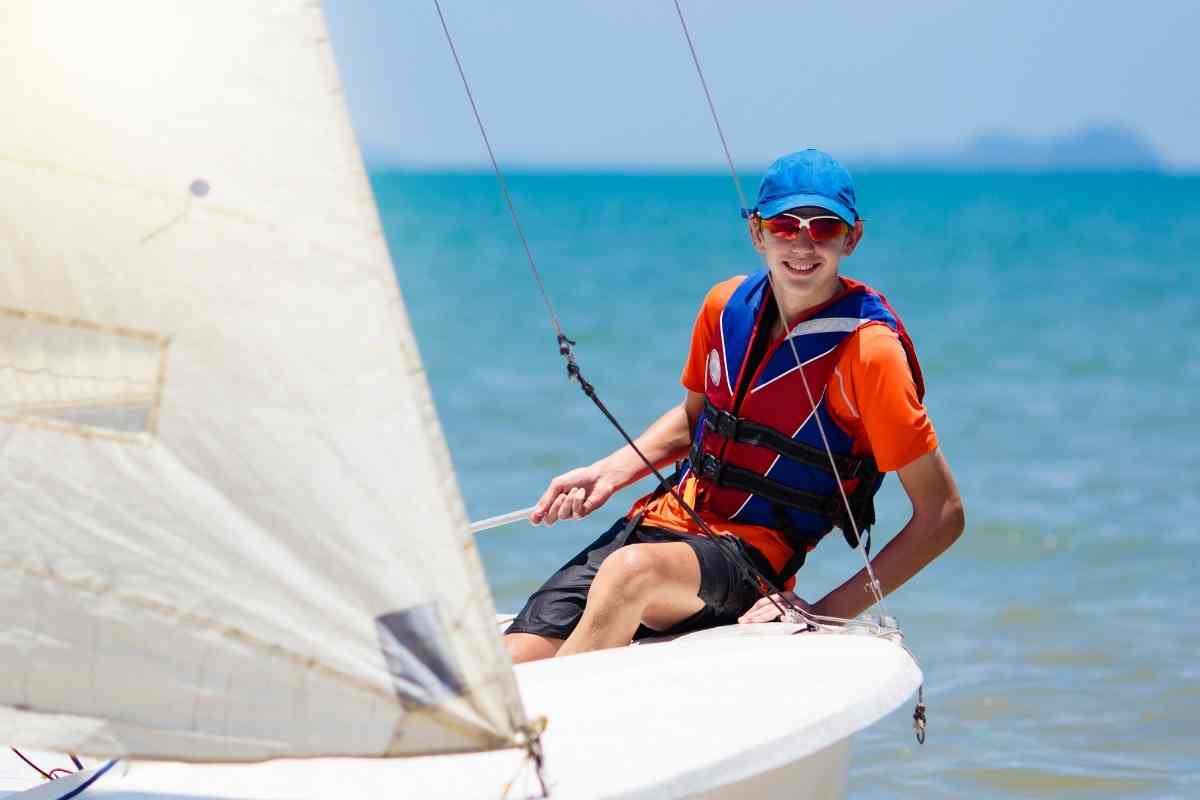
Can you learn to sail by yourself? You can learn to sail by yourself, and will likely have a great experience if you start with a small boat, practice a variety of techniques in lots of different conditions including docking and anchoring, and it’s best that you capsize at least once or twice.
You want to learn to sail but don’t want to worry about having an instructor or attending classes. Here’s what you need to know about learning how to sail by yourself.
Suggested Reading: What Is The Best Sailboat To Learn On
How to Learn to Sail by Yourself
To Read or Not to Read
If you have no experience with sailing but want to learn, the approach you take to your will vary dramatically based on your own personality.
If you love to read about something before you take it on, you will likely be searching online or buying how-to books about sailing.
There’s nothing wrong with getting some how-to books about sailing, but keep in mind that sailing isn’t necessarily the best skill to learn from a book. Books often make it seem a lot more challenging than it really is.
If you are reading about how to sail before you start sailing, you are likely to find that when you get out on the water and try the technique you were reading about, it’s much easier in practice than you expected.
It’s fun to read sailing tips and it can be extremely helpful to be acquainted with some of the fundamentals before you get out on the water, but be careful not to read too much to feel like you are ready to take on trying it in real life.
On the other hand, if you are a person who likes to jump in headfirst, you might not feel like reading anything before you go get your first skiff and start sailing. This approach is also likely to lead to problems.
Ideally, you will read enough to be able to decide what’s the best equipment for your needs and learn some essential safety information before you are out on the water.
Get a Little Boat
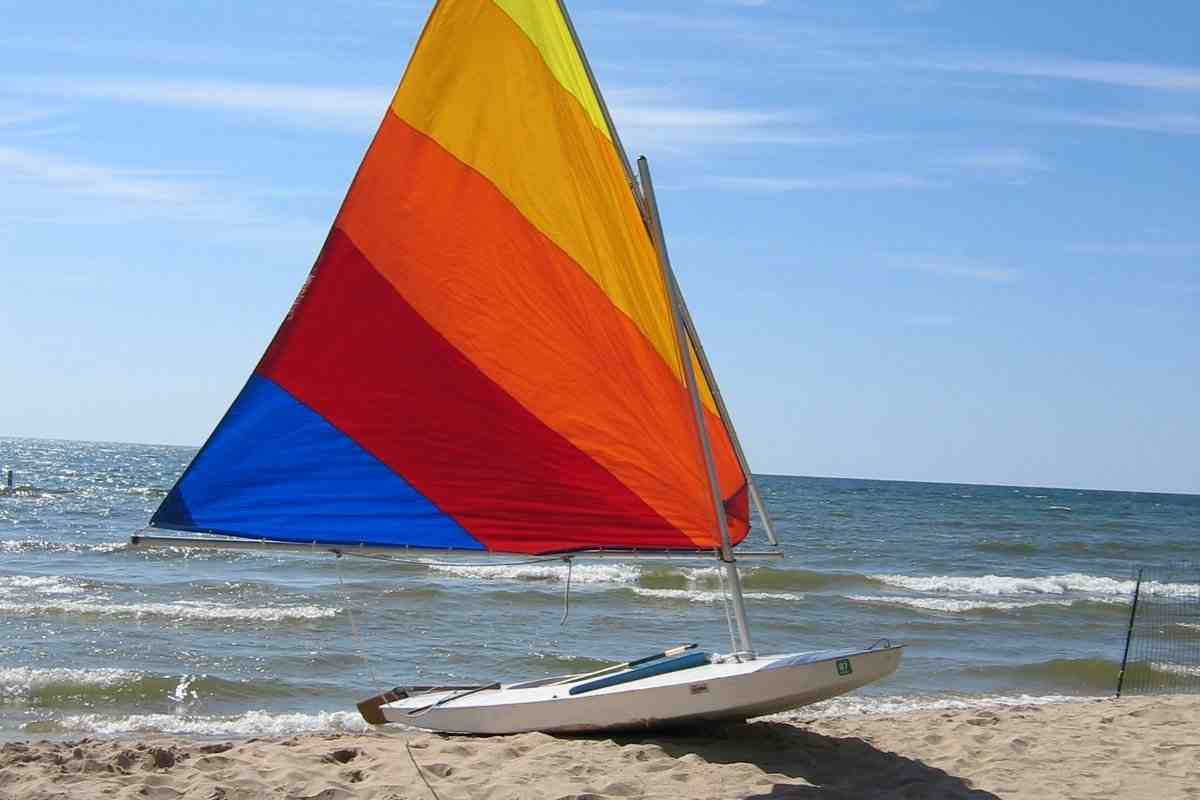
Once you’ve done a little bit of basic reading, the next step is to get out on the water. It is best to start with a small sailboat that is both inexpensive and easy for you to handle.
Even if you can afford a bigger boat and intend to have a larger sailboat in the future, starting with a small boat is best.
Very small sailing skiffs are extremely responsive, helping you to understand exactly how the wind and your handling affect how the boat moves.
Larger boats take much longer to respond, making it harder for you to understand how your actions affect it. Larger boats also have more rigging and often more sails.
More ropes and more sails to control is more challenging, especially when sailing alone.
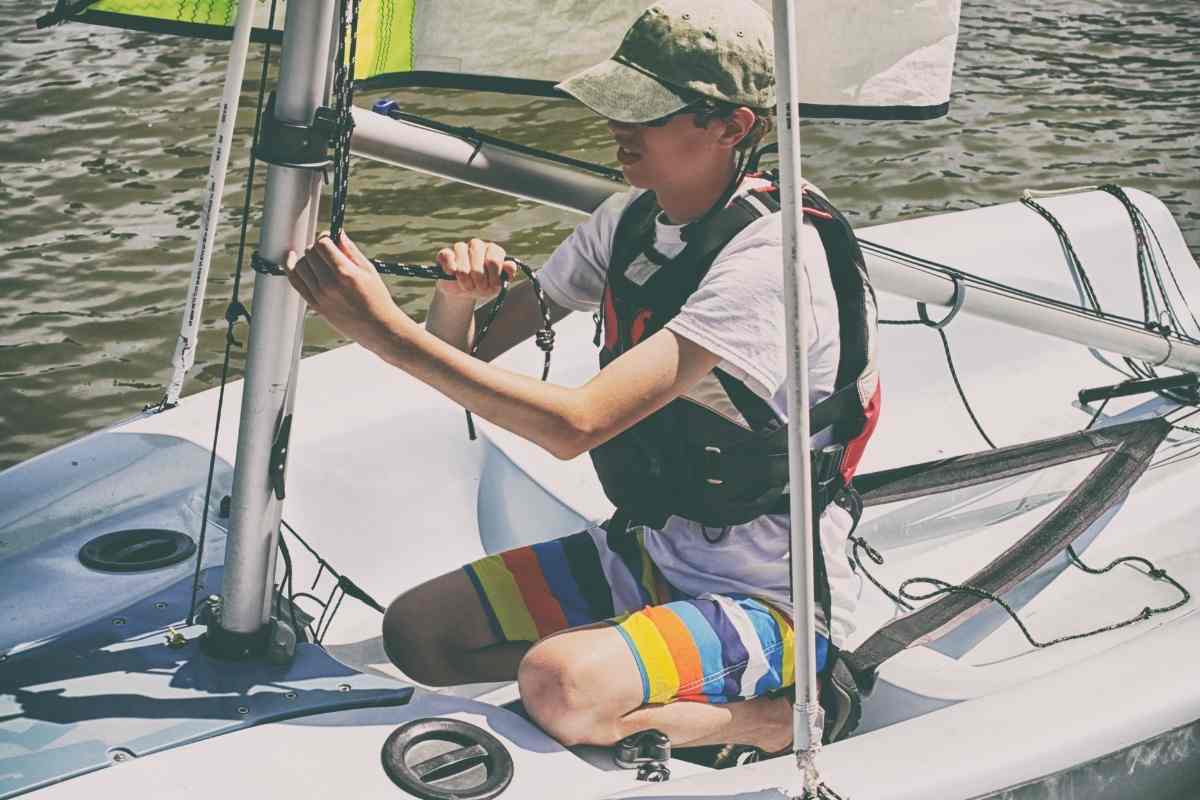
When you’re starting out, you want a sailboat that is as simple as possible. Another advantage of small boats is that they capsize much more easily and are righted more easily. You may assume that you do not want to capsize when you are learning to sail, but it’s a mistake to avoid capsizing when you are learning.
Capsizing a small sailboat helps you to understand what leads to a boat capsizing so that you will be able to predict and correct a capsize when you are sailing a larger boat.
Sail as Much as Possible
One of the biggest advantages of learning to sail by yourself is that you don’t need to pay an instructor for their time. That means you can get out on the water as much as you like.
The more you learn, and especially the more consecutive hours you put into sailing at the beginning, the more rapidly you are likely to feel that you are developing into a competent sailor.
Something about regular practice sessions and trying new things seems to help internalize sailing concepts at the beginning.
Whether you can spend a lot of consecutive time sailing or you can only spend a couple of weekends a month, spend as much time as you possibly can on the water developing your sailing skills.
Sail in Different Weather Conditions
Taking your little sailboat out when conditions are perfect can be very tempting, but this can be a serious mistake.
No matter how carefully you plan, there are bound to be occasions when you need to deal with bad weather.
If your only experience is in beautiful, sunny days, you are going to be very poorly prepared the first time you are caught off guard by a thunderstorm.
Make sure that you sail places that will be safe to capsize.
Push your boat and yourself to the limit to be prepared when you are unexpectedly pushed to your limits in a larger, more valuable boat down the road.
One of the most important skills you need to master in inclement weather conditions is how to drop your sails quickly.
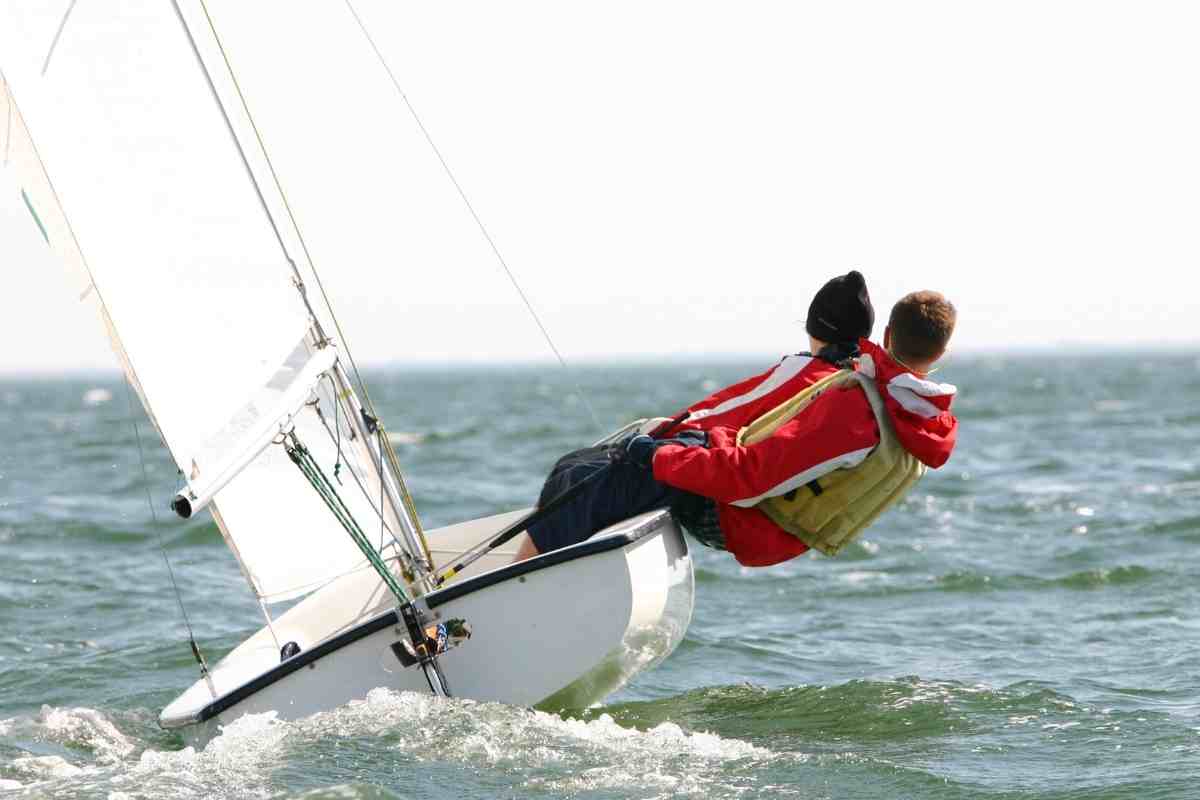
If a storm suddenly comes up, being able to drop your sails rapidly can make the difference between a safe sail home and ripping up your sails and capsizing.
Learning how to drop sails quickly also allows you to reef in your sails and sail under reduced sails, which can help you to maintain great time even in very high wind and rough weather conditions without taking a risk in safety.
Practice Anchoring and Docking
It may feel a little bit silly to practice anchoring and docking in a tiny sailing skiff, but you will likely be surprised by how well these skills translate when you get a larger boat.
Understanding the physics of how a boat pulls against a dock or anchor line teaches you how to position your boat properly against the tide and wind to put you in the ideal condition to dock or anchor.
Doing this while in a very small boat means you can use your strength to pull the boat around if you do it wrong.
It’s much better to learn the skill now on a little sailboat than struggle to dock or anchor your large sailboat.
These are some of the skills that sailors most often overlook when practicing in a small boat before moving up to a larger cruiser.
Talk to Other Sailors
Just because you are learning to sail by yourself doesn’t mean that you can’t take advantage of the experience of other sailors. Talk with sailors you might encounter at the marina, on the water, or even at local restaurants.
If you have an opportunity to chat with another sailor, you would be remiss to pass it up. Whether you like or agree with another sailor’s style or not, anyone with a lot of experience has something to teach you.
Most sailors love taking the opportunity to brag about their boats and tell stories of their adventures. Be sure to take advantage of the opportunity to ask specific questions.
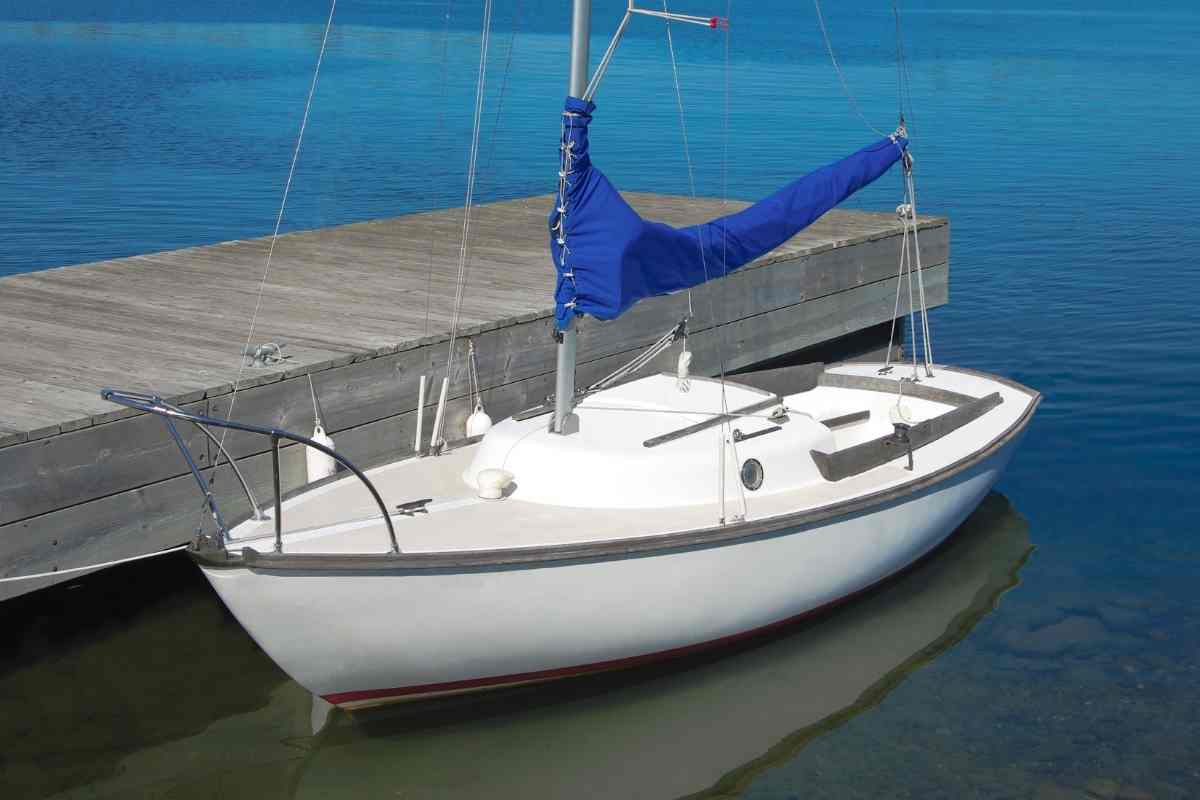
If they are telling you about how they managed to pass through a difficult area under bad conditions, ask about exactly how they had their sails trimmed, what navigation equipment they used, and what tells there were in the water or conditions to tell them where to sail and where to avoid.
Even if you love learning on your own and don’t relish other people’s input into your sailing, a little bit of understanding from other sailors can make a huge difference.
| Advantages of learning to sail by yourself | Disadvantages of learning to sail by yourself |
| You don’t need to pay an instructor | Learning by yourself can lead to costly mistakes |
| You can take as much time as you like to master skills | You may be practicing a technique incorrectly or less effectively |
| You may be more willing to experiment and take risks when there isn’t somebody telling you how to do it | You may be afraid to take certain risks without someone to help if things go wrong |
| There’s a great satisfaction in mastering sailing all by yourself | There are a lot of lessons to be learned from somebody experienced in sailing |
Enjoy Your Solo Cruises
Learning to sail by yourself is incredibly exciting. You are sure to have unforgettable experiences navigating the ocean on your own.
Be careful to learn on a small craft first and practice every possible situation and condition to set yourself up for solo sailing.
Keep in mind that while you can learn a lot from books and articles, the best teacher when it comes to sailing is your boat and the conditions in which you sail.
